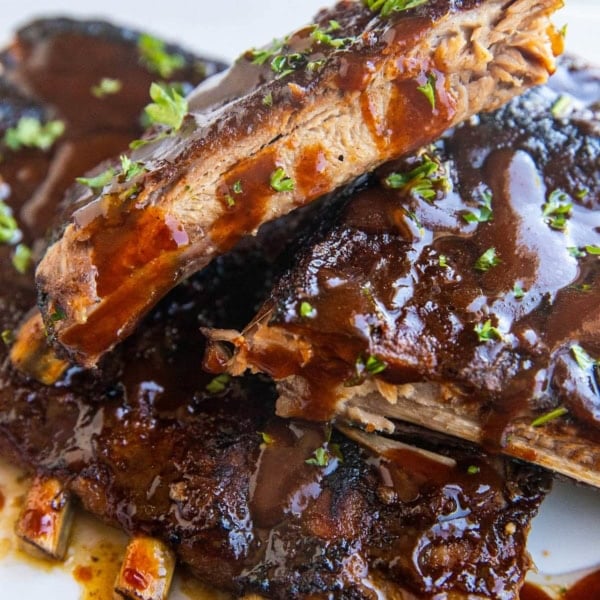My gut healing protocol. This is the story about how I restored my gut health through a targeted gut healing protocol under the supervision of a qualified medical professional. Through my gut healing protocol, I was able to eradicate a parasitic and bacterial overgrowth, heal leaky gut, and hormone imbalances.
Disclaimer: I am not a health professional and am not recommending you mimic my gut healing protocol. Before making any changes to your health and lifestyle, be sure you seek advice from a qualified individual.

Wow, what a trip.
If you have been around my site for quite some time, you may know I had some pretty gnarly gut issues for a number of years. I spoke about it in a few blog posts, and then went radio silent on the topic. Well, here I am with an update, as my gut health made a huge turnaround for the better over the last year after completing my gut healing protocol.
I know many of you have battled with your own gut health, so I wanted to share what it took for me to heal my gut. My hope is something in this post will help you with you restore gut health.
This is a three-part series. I’m starting by giving you the hard facts and figures – the medical stuff – in this post. Equally important to the physical is the emotional and spiritual part of healing, so I’ll be following up with a separate blog post on the psychological and mindset aspects of my journey. Finally, in a third post, I will be sharing with you supplements for gut health.
UPDATE (8/11/2020): You can read Part Two here: How I Healed My Gut, Part Two: Healing Through Mindset and Manifesting.
If you’re currently dealing with any health-related problems, I encourage you to read this post! I truly believe the mindset changes I made were what ultimately brought me to where I am today.
To any of you who are struggling, know that you are capable of healing. Your body is designed to heal, and there are so many people out there who can help you along the way.
If I could gather up all of my experience into one perfectly packaged unsolicited advice bomb, it would read a little something like this: your healing will begin the second you make space for it, and healing is just as much a state of mind as it is a physical process.
Buckle up!
My Gut Health Timeline:
Discovery: I began having IBS symptoms in 2011 but they were intermittent and largely manageable…mostly they were annoying but not debilitating.
The Plot Thickens: My gut health began declining in 2015, then took a dramatic turn for the worse in 2017 and peaked in 2018. I was going through a breakup, was writing a cookbook, was over-exercising and under-eating and was constantly stressed.
My symptoms: I reacted to almost everything I ate, the worst being high-FODMAP foods. I had constant gnarly smelling gas (but we’re talking constant), chronic constipation punctuated by loose, gnarly stools, low energy, depression, acne, persistent athlete’s foot and occasional hives. You can read more about this phase in my blog post, My Journey with Gut Health.
When my gut health was at its worst, I was afraid to leave my house. Anyone who has struggled with chronic illness has likely experienced an immense amount of fear wrapped into their condition.
Trial and Error: I spent 2016 through 2018 trying to heal myself through food and lifestyle by troubleshooting my own health using internet research. Stubbornly, I thought if I tried hard enough on my own, I would be able to figure it out.
During this time, I went to an integrative health doctor, but we never uncovered the source of my symptoms and our efforts to improve my gut health were minimal. I tried everything from elimination diets to natural antimicrobials to celery juice, to coffee enemas to colonics and more. It seemed as though the harder I pushed, the worse I would become.
The Resolution: Deciding once and for all I couldn’t figure out my gut issues by myself, I made 2019 the year of the doctor. It took many attempts to find the right practitioner, but I got in contact with Dena Norton in July of 2019 and it has all been uphill from there. She was the person who developed my gut healing protocol, enabling me to get back to health.
The Year of the Doctor (2019):
During 2019, I worked with 5 different medical professionals to help heal my gut. The short story is, Dena Norton, who I continue to work with, played a pivotal role in bringing health back to my life. But there is more to the story, so I’ll start from the beginning.
The Holistic Nutritionist: Understanding western medicine often overlooks root causes, I began by seeing a Holistic Health Specialist who did muscle testing in order to determine my ailments as well as the supplements that could be beneficial to me. While the supplements did help, the muscle testing did not uncover the root cause of my gut issues. Even though my symptoms improved slightly, they only did so for a short time, as the root cause was still present.
The Gastroenterologist: Being the science-minded person I am, I acknowledged that alternative medicine has its place but so wanted more testing and scientific backing. I went to a gastroenterologist who gave me a colonoscopy, endoscopy, and had me take a blood test for Celiac. He also had me take two standard stool tests. Everything came back normal. Still, I was experiencing nasty gut symptoms. This entire experience did nothing to advance me, but rather helped me rule out things I didn’t have.
The Functional Medicine Doctor: Reverting back to what I believe to be true, I went to a functional health doctor who happens to be one of the leading gut doctors in the country. I’ll skip a long story and say I didn’t get what I needed out of the experience.
The Registered Dietician (Dena Norton): Here is where the tables turned in a BIG way. I began working with Dena, who is a Registered Dietician. Through the Dena, I…
- Took the GI Map and learned I had a parasitic infection, H. Pylori, very low immune cells, and a SUPER leaky gut. We addressed all of this with antibiotics (prescribed by my general practitioner) and a gut healing protocol. This is when my healing began. A quick note: while Dena recommended I take natural antimicrobials to address my overgrowths, I had tried them so many times in the past with no result that I chose to bypass that option and go straight for the pharmaceuticals. Everyone’s journey is different so whether one takes natural antimicrobials or pharmaceutical antibiotics is entirely person-specific.
- Did a comprehensive blood panel, revealing I am hypothyroid. I began taking Levothyroxine (synthetic thyroid hormone) prescribed by my general practitioner.
- Took a Food Sensitivity Test and learned I’m super sensitive to coffee, dairy, cumin, tuna, and a few other things
- Did the Dutch Complete hormone test. I am still waiting for results on the hormone test, but because I consider myself to be a strong healthy individual at this point, I don’t think the results are super relevant to this post.
The General Practitioner: In conjunction with Dena, I worked with (and continue to work with) a general practitioner. Because Dena is not an MD, I also needed my GP to prescribe the medications I needed and order some of the lab tests I took.
Let’s dive deeper into the lab tests I took, as they were what really revealed what was happening so that we could address each issue appropriately.
Lab Tests For Gut Health:
GI Map
What is the GI Map?: The GI Map is a stool test that looks for the DNA of various bacteria, pathogens, viruses, and more. In addition to testing for harmful bugs, it also looks for the DNA of beneficial bacteria and yeast.
How the GI Map Works: You poop in one of those cardboard containers they give you when you buy a corndog from the fair, collect some of your stool in a vial, shake it up, and ship it off. You then wait while the experts determine what wordly critters live inside of you. A report of your results is sent to your practitioner (I did mine under Dena Norton), who then analyzes them with you and comes up with an action plan if necessary.
The GI Map also tests for Secretory IgA, which are basically little soldiers that live outside your gut that peak in every once in a while to see what’s going on. If there is something amiss (bad bacteria/pathogens/viruses/parasites), these soldiers communicate with your immune system to destroy the threat. Low secretory IgA can then be translated to a weaker immune system.
In addition, the GI Map also tests for Zonulin, which is a protein that permeates your gut lining when it is damaged. The theory is, the higher your level of zonulin, the leakier your intestines are. So far, this is the only scientific measure I have come across to determine whether or not an individual has leaky gut syndrome. Most western medical doctors do not recognize it as an indication of leaky gut, and many don’t believe leaky gut exists.
After taking the GI Map, you’re given a complete report showing everything that was tested. One column shows the “normal range” of the bacteria/fungus/virus/yeast, etc., and another column shows your result. Based on your result, you can tell if you have an overgrowth or infection.
All humans have an ecosystem of good and bad organisms living inside them. Don’t be alarmed. Even if you’re perfectly healthy, you’ll likely have something come up on your GI Map. Depending on the situation, what comes up may not be a problem whatsoever. It’s only when the concentration of specific organisms or viruses are above a certain concentration that the issue needs to be addressed.
In addition, you can have no gut symptoms but still have an overgrowth or infection.
In my opinion, the GI Map is probably the most helpful test a human can do in understanding what is happening inside their gut.
My GI Map Results: After doing the GI Map, I was given a report showing the concentration of DNA of these various good and bad critters. I had a parasitic and bacterial overgrowth, and all of my good bacteria were low.
My GI Map revealed I had blastocystis hominis (a common parasite), h. Pylori (the bacteria that can cause ulcers, heartburn, and other upper abdominal issues), and extremely high zonulin (meaning I had massive gaping holes in my intestines).
Normal range for zonulin is lower than 107 ng/g, and mine was 1099.2.
In addition, my secretory IgA was very low, meaning my immune system was low in soldiers to look for foreign invaders. Normal range for Secretory IgA is 510 – 2010 ug/g, and mine was 279.
I was lacking in healthy beneficial bacteria (in particular, my Lactobacillus levels were very low), so in addition to getting rid of the bad, I would also need to introduce the good.
With this information, Dena and I decided on a protocol together – to kill the parasite and h. Pylori, and to heal and seal my gut lining. It was my decision to drop a nuclear bomb on the parasite and bacteria using antibiotics rather than slowly killing it with natural herbs. At that point I was so over being sick that I just wanted to start fresh.
Because Dena, my RD, could not prescribe antibiotics, I took my GI Map results to my general practitioner, who agreed I needed to address the issues and she prescribed me antibiotics. My course of antibiotics was for 10 days, during which time I also took probiotics and omega-3 fish pills.
The concept was to kill all living creatures inside me but also introduce helpful probiotics to do some healing between rounds of antibiotic pills. I continued (and still continue) to take probiotics in order to repopulate my gut with healthy bacteria. I also take a supplement to heal my intestinal lining, along with a multivitamin, and a few other supplements. I’m going to go into detail about the supplements I take in a future post!
How the GI Map Differs from a Regular Stool Test: A standard stool test (recommended by most gastroenterologist and western medical doctors) looks for actual specimens. Meaning, a lab technician sifts through your stool to see if they can find parasites and ova (eggs). If there are none present in your stool, or if the lab technician is inexperienced in looking for such things, your result comes back negative. Based on this information, you can probably see how inaccurate a regular stool test is.
Comprehensive Blood Panel:
A complete blood panel looks at your vitamin and mineral levels, blood platelets, white blood cells, hormone levels and more. It is common to do blood work each year, but doctors often don’t order up very complete tests.
At the recommendation of my friend, Robb Wolf, I had EVERYTHING tested. The most notable results were an elevated TSH, and low T3 and T4 to reveal I’m hypothyroid (for which I take medication).
The test also showed I was very low in iron, so I now take an iron supplement, cook only on cast iron and eat plenty of beef and chicken. In addition, I have high cholesterol – but it’s mostly good cholesterol so I don’t take medication to lower it. The panel also tested vitamin and mineral levels, and much much more, all of which came back normal.
Before doing this blood panel, I didn’t think it was important to keep tabs on these things, but I now can’t stress enough how crucial it is to stay on top of it. Because these types of tests are covered by insurance, I would strongly recommend you do it as it takes very little time or effort and as long as your insurance is decent, it should be nearly free.
While a standard comprehensive blood panel doesn’t peak into your gut, it can be telling that something is amiss. Addressing what comes up in your blood panel can improve your overall health and boost your immune system.
My blood panel added an extra layer of knowledge to my gut healing protocol, which enabled my body to function the way its supposed to.
ELISA-ACT Food Sensitivity Test:
How to ELISA-ACT Food Sensitivity Test Works: The food sensitivity test I took is a blood test, wherein your blood is tested against several hundred foods and household items (think: cleaning supplies, artificial ingredients found in food, etc) to determine if your immune system reacts to them.
In this sense, you aren’t testing for food allergies, which your body reacts to immediately, but rather reactions that occur throughout the digestive process and cause damage to the intestines and create inflammation in your body (this occurs 12 to 48 hours after eating the food). My food sensitivity test revealed I am extremely reactive to coffee and dairy and moderately reactive to cumin, red food coloring and tuna.
I was already doing pretty well before taking the food sensitivity test, as my IBS symptoms had basically disappeared after killing the parasite and healing my gut, BUT after I cut out coffee and dairy completely, my health leveled up quite a bit. I didn’t realize how good it could feel to feel good!
Dutch Complete Hormone Test:
How The Dutch Test Works:
You pee on little test strips for a month, send them off and wait for the lab to determine which of your hormones are caddywompus. From there, your practitioner can determine if anything needs further inspection and/or if you need supplemental hormones.
To throw a monkey wrench into this whole conversation, I stopped having periods in 2018. This could be due to my gut health or the fact that I was in a constant pattern of over-exercising and under-eating. I went a year and a half without a period, and while I have periods intermittently, I still have not begun regular menstruation.
With Dena overseeing the test, I ordered up the complete Dutch hormone test to see if there is anything off. There is a strong correlation between gut health and hormones, so when one is off they are likely both off.
If your body is fighting an infection, it makes sense that all hands are on deck to kill the infection rather than to procreate. If there is something off in your gut, it is very likely that your hormones are out of balance in some fashion.
I haven’t received my results from the hormone test yet and I may or may not share them, depending on how relevant or useful I think they are to you.
So to make a very complicated healing journey very simple, here is…
My Gut Healing Protocol:
This is the protocol Dena developed for me to help heal my gut. I’m keeping it vague because I don’t want anyone to repeat my protocol without working closely with a medical professional. Everyone’s microbiome and healing process is unique. I still take all of the same supplements I began taking during the killoff phase in order to give my gut the support it needs to heal.
- Antibiotics to kill blastocystis hominis and h. Pylori. I used Praziquantel which is commonly prescribed for blasto and some other parasites. Again, I went the pharmaceutical route instead of using natural antimicrobials.
- Probiotics to restore my gut flora.
- GI Revive – a combination of L-Glutamine, marshmallow root, and slippery elm to heal my leaky gut. This supplement has been truly transformative for healing my gut.
- Omega 3 fish pills
- Beef gelatin (I put it in my matcha every morning) to help heal leaky gut
- Iron Supplement to bring up my ferritin levels.
- Digestive Enzymes and Ox Bile with every meal, to help break down protein, carbohydrate, and fat.
- Magnesium to support good digestion, sleep, and hormone health.
- Electrolytes for hydration and brain health. I didn’t realize I was chronically dehydrated until I started adding electrolytes to my water and instantly had more energy and focus.
- Colostrum to boost my Secretory IgA levels. I use colostrum derived from goat milk because I find I tolerate goat dairy better than cow’s dairy.
- Low-inflammatory diet, moderate exercise, avoiding the foods I’m sensitive to.
Notice the last part is last for a reason. Food and exercise are very important, yes…but if there’s a parasitic or bacterial infection, it is incredibly difficult to get rid of with diet and exercise alone depending on the severity of the infection.
I will be posting more specifics about the supplements I take for my gut health in the future, but I still encourage you to work with an experienced practitioner before you begin any sort of killing or healing protocol.
The Importance of Seeking Medical Attention:
Simply put, you can live your whole life uncomfortably, but you don’t have to.
Based on my story, you can see it is easy to make the healing process longer than it needs to be when the right medical professional isn’t sought out from the beginning. I troubleshooted on my own for too long and once I did begin seeking help, I was unsure exactly where to go. I feel I lucked out in coming across Dena.
Without the GI Map, I never would have known the root cause of my gut symptoms as standardized methods for testing did not reveal any answers. Knowing exactly where my infection was coming from enabled me to address it and thereby heal from it.
When I consulted my gastroenterologist about my parasitic infection and leaky gut, he said they don’t treat parasites and they don’t believe in leaky gut. Suffice it to say, I stopped seeing that GI doctor. You can surmise there are large differences in the way professionals in various sectors of the medical field deal with things, and for me not dealing with my situation wasn’t an option.
My gut healing protocol of kill and heal worked to resolve my symptoms and gave me a far better standard of living. Had I continued relying on western medicine, I’m certain I would be exactly where I was, if not worse. This isn’t to suggest you should not seek attention from a GI doctor…it just happened to be that mine was not a part of my solution.
Similarly, before The Year of the Doctor, I got far off track with various cleanses and coffee enemas in attempting to improve my gut health. While parts helped in the moment, they never addressed the underlying issue. Even though momentary relief was much needed, nothing improved in the long-run until I found the help I needed.
When choosing someone to work with, be sure they are capable of running the right labs to nail down your underlying issues and are also proficient in the necessary targeted remedies to get your body functioning optimally again.
Best Foods For Gut Health:
The cold hard truth about eating to heal your gut is an underlying gut issue cannot be resolved through diet alone.
There are so many conflicting articles on the internet regarding what you should do for good gut health. What are the best foods for gut health? Which foods are bad for gut health? It’s all very convoluted and frankly neurotic.
The health community is in consensus that all eliminating processed foods, particularly gluten, dairy, and sugar helps improve gut health, some tout high-fiber diets, others may recommend a carnivore diet…and everything in between.
In general, those who face chronic gut issues are better off spending their time and energy figuring out the root cause of the problem versus elimination diets. Furthermore, many people who suffer from gut problems naturally don’t want to eat as much, which can actually be detrimental. While fasting is a trend in the health community and certainly has its place in healing, your body simply needs adequate calories to heal. Excessively restricting calories on top of restricting foods will not help but will often set a person back in their healing process.
That said, if there are specific foods that are known triggers, it makes sense to avoid them. For instance, high fiber foods (particularly onions, garlic and cruciferous vegetables) aggravated my GI when I had IBS, so I limited the amount I ate until I healed.
What helped me when I was in the thick of a flair was eating low-FODMAP foods, sweating regularly, and prioritizing protein and resistant starch over fiber.
If you’re starting (or are in the thick of) a low-FODMAP diet and need some inspiration, you can try my 46 Low-FODMAP Dinner Recipes. Just remember, Low-FODMAP should not be used as a long-term solution to control symptoms, as it will not fix a gut imbalance.
If you’re at a point where you’re trying various elimination diets to no avail, it’s likely time to figure out the culprit of your symptoms and work with a qualified professional who can guide you through the process.
What Are the Symptoms of Leaky Gut:
The intestines have tight openings that allow nutrients and water to permeate and pass into the bloodstream. Leaky gut syndrome is a condition where those openings stretch and become wider, allowing whole food particles to pass through into the bloodstream.
Common symptoms of leaky gut are:
- Chronic constipation and/or diarrhea (usually a combination of the two)
- Fatigue/low energy
- Chronic bloating
- Headaches or migraines
- lower abdominal pain
- Mood imbalances / depression / irritability
- Anxiety
- Skin rashes, eczema, acne
- joint pain
As I mentioned earlier, my GI Map results showed I had extremely leaky gut. When your intestines are leaky, you aren’t absorbing nutrients properly and you have an unhealthy GI, which is a perfect breading ground for harmful bacteria and pathogens.
The environment is ideal for illness to take hold, as your good bacteria can only do so much when your intestines aren’t sealed. My gut healing protocol eradicated the overgrowth of bacteria and parasites as well as healed and sealed my gut so that my body could fully recouperate.
Correlation Between Gut Health and Hormones:
There is a lot of science behind the gut-brain axis as well as how hormones and gut health interact. It makes sense…if yout gut is in disarray, your entire body and immunity are effected. If your hormones are out of balance, your digestion is off, which can then create imbalances in your gut microbiome.
I’ll allow the professionals who are articulate in such matters to be your educators, but I will point out one tidbit I learned that I found fascinating. It turns out that blastocystis hominis, which is the parasite I had, can be responsible for hashimoto’s hypothyroidism. Hashimoto’s is the autoimmune form of hypothyroidism, wherein your body attacks your thyroid, causing it to malfunction. You can read more about this in Izabella Wentz book, Hashimoto’s Protocol.
Correlation Between Gut Health and Mental Health:
Similarly, there is a strong correlation between gut health and mental health. The vagus nerve runs from stomach to brain stem, so if something is wonky with your digestive system, you may also experience anxiety and/or depression.
I wouldn’t consider myself to be a Type A individual or to be particularly particular, but when my gut symptoms were at their worst, I felt anxiety daily, had a bleak outlook on life, and also had obsessive compulsive behavior. It took healing my gut to calm my nervous system and to cease the obsessive behaviors to which I had grown accustomed.
Where I Am Today:
I feel like a newborn baby. A completely different human. I look back on who I was when my GI was at its worst before gut healing protocol, I can’t even believe that was me.
I would consider my GI to be mostly normal now. I can eat many of the higher FODMAP foods I had to steer clear of, like onions, garlic, asparagus, etc. The gas is completely gone, I have regular bowel movements, and my small bouts of constipation are short-lived. My anxiety has lifted, my energy is great, and my skin glows!
My thyroid function is in the normal range.
My hormones are still whacky, but I’m fine with that being a work in progress. The process of balancing them is not an anxiety-ridden concept the way healing my gut was.
I’m in a healthy, loving relationship with an individual who knows my health history and cares that I remain healthy. He’s the most honest and giving person I know and I can’t believe I lucked out to have him in my life.
Follow me on Instagram for more health-related content and for updates on my health 😉
You can read more about where I’m at today here: An Update on My Gut Health – Life After IBS.
I take it one day at a time. I try not to get stuck in the feedback loop of needing to control, needing to micromanage my health.
It has been a little less than one year since I began my gut healing protocol with Dena, and I am constantly shocked by the difference between my health today versus my health a year ago. I hope one year from now, all of this will be just that thing that happened that one time. I truly believe it will.
What I do for my gut health today: I still take probiotics, omega-3s, a multi-vitamin, magnesium, electrolytes and GI-Revive . I still eat a fairly low-inflammatory diet, but I try to avoid being overly restrictive, though there are some foods I stay away from because I either don’t process them well or they cause me depression. I do avoid gluten, dairy, excess sugar, and beans, and I don’t drink coffee or alcohol.
I notice if I eat too much sugar, I get incredibly depressed, so while I absolutely have a sweet tooth, I try to keep it under control. I’m definitely an abstainer by nature, not a moderator, so for me it works best to eat zero sugar.
I don’t believe we ever really “arrive” as humans. This is the same when it comes to health…there really is no destination and we don’t ever really just get to give up (unless of course we choose the path of unwellness).
We are on this constant journey. Embracing the ebb and flow and letting go of the need to control allows us to become who we are meant to be rather than fooling ourselves into pinpointing who we are. We are here to help each other.
I’ll be following up with another post within the next week on the mindset aspect of healing. Far more than the medical side of gut health, the mindset aspect is arguably more important. It happens to to be the fact of my story I find most interesting.
As always, feel free to comment below with any questions or input on my gut healing protocol. I’m always open to hearing your stories – after all, we are all a part of this system together.
Love, squeezes and kitty cat sneezes.
xoxo























Hi Julia,
Thanks again for your very informative and great to read posts!
(I also read and commented on your “My journey with gut health” post.)
I was just wondering, you said you found out through the GI Map that you had h.pylori; when you got an endoscopy with your GI, did they not test/find the h.pylori?
Also, when you had SIBO, did you use the probiotics you recommended in your gut health journey? If not, how did you replenish your good bacteria after killing the bad?
Hi Lauri! My regular GP treated the h.pylori along with the blastocystis hominis. I’m actually not sure whether or not my gastro tested for h.pylori. His findings were all “normal” so that leads me to believe he didn’t test for it. I was never diagnosed with SIBO, so adding probiotics wasn’t a problem for me. After doing the course of antibiotics, I added three different probiotics – a lactobacillus probiotic, a soil based probitoics, and saccharomyces boulardii. These were at the recommendation of a functional medicine doctor. I did notice the saccharomyces boulardii messed with me a bit, so I only took it occasionally (maybe 2x per week). Once my gut health improved, I stopped taking probiotics and was able to eat probiotic rich food (mostly sauerkraut). Let me know if you have any other questions!!